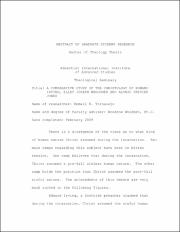| dc.contributor.author | Tornalejo, Remwil R. | |
| dc.date.accessioned | 2020-11-04T01:24:46Z | |
| dc.date.available | 2020-11-04T01:24:46Z | |
| dc.date.issued | 2009-02 | |
| dc.identifier.uri | https://dspace.aiias.edu/xmlui/handle/20.500.12977/154 | |
| dc.description | Unpublished Thesis (MTh)
Shelf Location: BT198 .T67 2009 ATDC | en_US |
| dc.description.abstract | There is a divergence of the views as to what kind
of human nature Christ assumed during the incarnation. Two
main camps regarding this subject have been in bitter
tension. One camp believes that during the incarnation,
Christ assumed a pre-fall sinless human nature. The other
camp holds the position that Christ assumed the post-fall
sinful nature. The antecedents of this debate are very
much rooted in the following figures.
Edward Irving, a Scottish preacher claimed that
during the incarnation, Christ assumed the sinful human
nature. E. J. Waggoner and A. T. Jones, early Adventist
writers, held similar views. This study attempts to
compare their Christologies. The main question that this
study addresses is, what are the similarities and
dissimilarities between their christological views?
Furthermore is there any textual evidence which proves that
Irving was read by both Waggoner and Jones? Finding the
similarities and dissimilarities between their ideas will
prove helpful to understand whether Christ during the
incarnation assumed the pre-fall sinless nature or the
post-fall sinful nature.
This study uses the historical and theological
method of investigation. From the results of comparing
their respective Christologies, similarities and
dissimilarities were noted.
In the course of this research, it became apparent
that their christological views are strikingly similar,
particularly on the subject of Christ’s fallen human
nature. They all asserted that Christ, during the
incarnation, assumed sinful flesh. They were in consonance
that since Christ came to redeem fallen humanity He has to
take humanity’s fallen substance. However, they were in
agreement that even though Christ’s flesh was sinful, He
was sinless in character for He never committed actual acts
of sin.
Irving’s, Waggoner’s and Jones’ Christological
views manifest a very close resemblance. But in spite of
this similarity a definitive answer as to whether Irving
influenced Waggoner and Jones could not be directly
established. | en_US |
| dc.language.iso | en_US | en_US |
| dc.publisher | Adventist International Institute of Advanced Studies | en_US |
| dc.subject | Jesus Christ -- Person and offices -- Comparative studies. | en_US |
| dc.subject | Irving, Edward, -- 1792-1834. | en_US |
| dc.subject | Waggoner, Ellet Joseph, -- 1855-1916. | en_US |
| dc.subject | Jones, Alonzo Trevier, -- 1850-1923. | en_US |
| dc.title | A Comparative study of the Christology of Edward Irving, Ellet Joseph Waggoner and Alonzo Trevier Jones | en_US |
| dc.type | Thesis | en_US |

